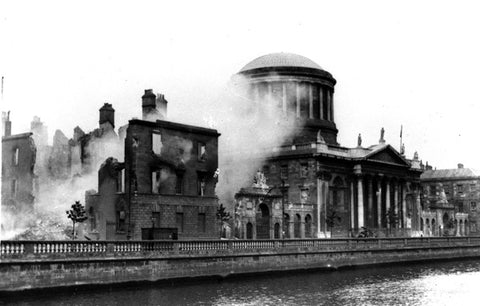Hello everyone Jenna here. When I decided to come to Ireland, I immediately wanted to see if it would be possible to research my families my roots here. As an Irish American, with a very Irish last name, I have always wanted to know my family history more and try to understand where my family came from before they came to America. This is the same for many people whose ancestors were a part of the Irish Diaspora. The connection to one's family history is very important. There could be reasons why your family members were raised in different ways. For example, It could be why your grandparents held certain values about money or how they have something in a house. Connections to these roots and understanding what your ancestors have been through can help you possibly bring back cultural aspects that might have been lost, and continue to tell the stories that you don't get from the history books in high school or university.
For someone like me, who is very interested in history, researching where my third great-grandfather is fun. If you are someone like me and you wish to delve into finding your Irish family history, These are five things I wish I knew before I started my family history journey that might help you in yours.
Know Ireland’s Record Keeping History
In Ireland, Coat of arms and heraldry were used to keep track of clans and their respectful septs. I previously wrote a blog diving deeper into the History of Irish Heraldry and where it came from as well and another about the Crests and Coats of Arms of the Top Ten Irish Common Surnames.
In Ireland’s history they have had a long relationship with religion and the Church.
The Protestant church did a better job than the Catholic Church. If you have Irish Protestant origins you might find more information than a friend who has Irish Catholic origins.

In 1922, during the war for independence, the Public Record Office housed in the Dublin castle was caught in an explosion. The Public Record office was home to the Office of Ulster King of Arms, the office with heraldic authority. The Office of Ulster King of Arms was in charge of things from Family Crests to genealogy, and historical records. The explosion was an unlucky matter for those who cherished Irish history, a huge smoke cloud rose from the building that housed the Public Record Office in Dublin Castle. Many Historical documents burned in the explosion. Some documents had been previously moved and narrowly escaped destruction. These documents now contribute to the Genealogical Office, which is now housed in the National Library of Ireland. The explosion sent documents into the city's air. A recollections happened however, many of these documents were affected by the explosion, and the bundles of half burned or charred documents were hidden away since their use could be very minimal. If you know these facts, now you know a place to start. Unfortunately, you could be unlucky and find that records of your history were destroyed but that doesn't mean it is a stopping point, as there are many different resources to use in your family history search.
Ask Family Members
One thing that is bound to be a fact is that you are probably not the only curious one in your family and you are bound to have at least one person with family knowledge or even a family genealogist (like I do) somewhere in your lineage. Getting background information, is very useful could include surnames, maiden names, deaths, marriages, and births. In my journey I was very lucky to be able to start with a lot of information. In my family, my aunt holds the majority of the information. We have a letter from the 90’s from a cousin of my Grandfather who did the research of our family and found out much of the background history. He gave in depth information on the Shaughnessy sept and some basic history to where our last name originated from in Ireland. In the letter it also included information in birth certificates, marriages and death dating back to my third great grandfather who came to America from Ireland in the 1800's. For me this was my starting point when I came to Ireland, and in the rest of my time here I hope to find some more.
Research Isn’t A One Day Excursion
Going into this journey you have to know that it will not be a one day excursion. Research will take hours upon hours and you don't have to do it in one shot either. Take your time. Remember you are researching your ancestors and that they all had a story. Take into account the family members who married into the family, their stories. Where they came from, as it is a part of you. In this time you can also look into your family heraldry and find your family's coat of arms. If you take this process to fast you might miss important information whereas if you take in a good pace, and take your time you will be able to process and understand information better.
Know Where to Start
If you are starting here at this blog you are on the right track, and i'm very glad you are here. Knowing these steps and information is helpful and I personally wish I had this advice before I got started in my research.
www.cenus.nationalarchives.ie is a good site to use if you have basic information from your family. For example, I know that my family is Galway, and that my last name is Shaughnessy. When I enter those terms all the Shaughnessy in County Galway that have been found on the 1901/1911 census are here. In my case, I know that my Third Great Grandfather had already left Ireland and would not be on this, however, I might have a lot of distant cousins I don't know about.


www.irishgenealogy.ie is another good place to start if you have some knowledge from family members or if you have some previous research. On this site you can pull up online versions of documents that have been uploaded. This site contains church and civil records that could be helpful if you are looking for marriage, death or birth certificates.

For documents from the church, which also might be helpful in finding marriage, death and/ or birth certificates. The National Library of Ireland has digitized records from the Catholic Church dating all the way back to the 1880’s.

Research In The Homeland

If you happen to find yourself traveling to Ireland, and you are in the middle of your research process, You can consult with the National Archives who have services and access to many different records. I have been recommended to go to the National Archives while I am here and I am hoping to make that trip.In my research I would say that the National Archives are not a starting place. If you do wish to consult with the National Archives, I would definitely have as much background research to make the process very smooth. The national archives even suggests on their website to have background research before using their services.
I hope you find these tips useful! Good luck

